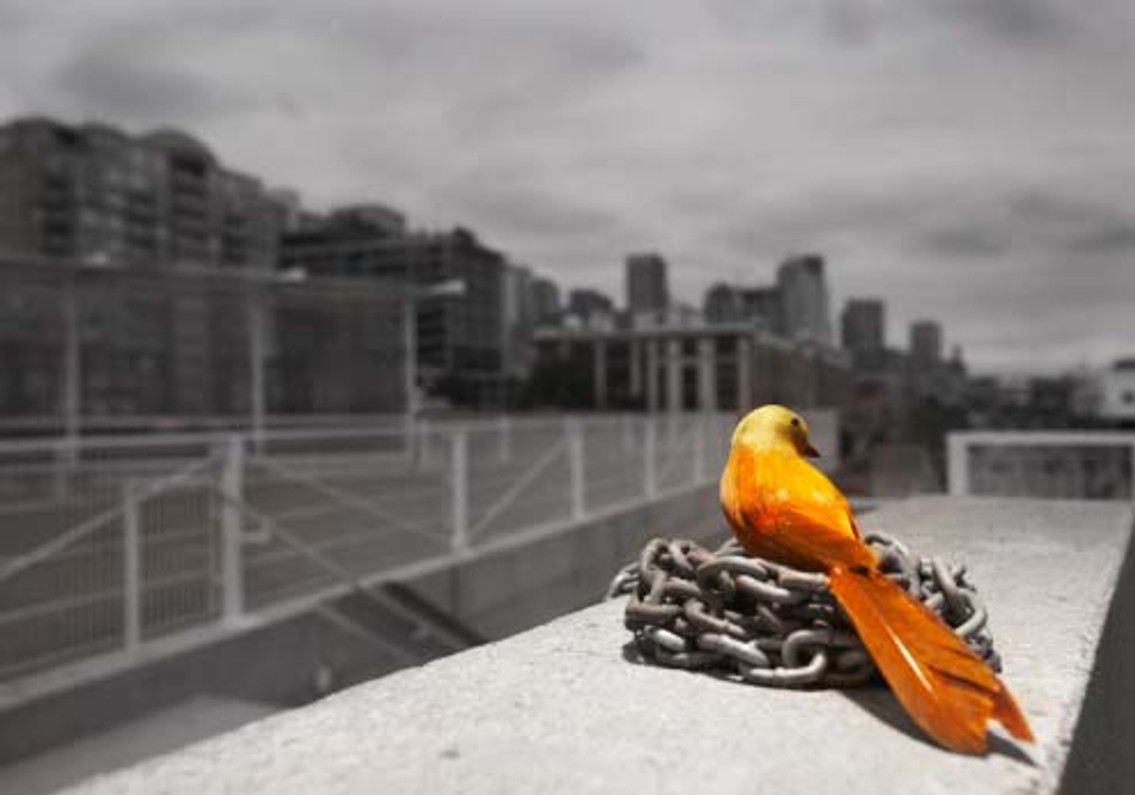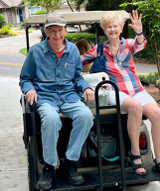A Fragile Life–A Memoir
It was just a whisper, a brush against my ear. “Elisheva.” He was calling my name. It was like that, on and off, since that dreadful day. Perhaps he had experienced the same calling from the grave, by his beloved parents. Both lost to him that year. My trips to the cemetery didn’t bring him closer. I’d crouch by his newly laid grave in the rose garden, and talk to him. I wasn’t supposed to be there. It was forbidden by Jewish law but I was looking for him, among the rows of unscented roses. It exacerbated the grief. I couldn’t find him. Each time I looked for the grave it had moved along by further burials.
He must have said his goodbye the night of the funeral. Exhausted, I’d dropped my head on my pillow and drifted off momentarily, waking when I felt my foot in someone’s grip. My eyes opened. “Oh it’s you, Michael.” I relaxed into his caress. He sat, as he had so many times, on the edge of the bed and massaged my foot, smiling. The blankets draped over my long leg with my foot resting in his hand. My long and slender foot, funny feet, he said, because his feet were fat with stubby toes. It felt as it always had, comforting, loving and his way. For a few moments I forgot. Then as swiftly as he came, he began to fade. “Don’t go.”
The police came to the door. From my study I could see them as they opened the picket gate and made their way up the path. I knew why they had come. Two young, uniformed police their faces prepared to deliver the news. Once before, a policeman came to the door to deliver Michael’s briefcase. I thought that was odd, but Michael had an explanation so I didn’t give it anymore time. Perhaps, today…no, I knew why the police were visiting, but I wasn’t prepared. Somewhere between the vestibule, beside the turn-of-the-century, coat closet, at the entrance to the five feet wide, hallway of our beautifully renovated, Edwardian home, I threw a hissy fit of despair. What had they said, the police? Whatever it was didn’t warrant my flailing about kicking and screaming as if this reaction would rewind the reality. I watched this performance, standing in the doorway to the right of my other physical self. I almost helped myself up from the floor. The policemen, ducking nasty, kicking limbs attempted to console me, but I stood by reprimanding this hysteria. Those poor, young cops, can’t I see, I am distressing them? I was barely conscious of my two small children, standing frozen at the other end of the long hall. Their little faces incomprehensible. Eventually, I composed and allowed someone to help me to the living room. “I am so sorry, so very sorry,” I protested, sipping on a tumbler of whisky with no recollection of how it had come to be in my hand.
The policemen’s, naive, compassionate, sad faces were striking. We sat in front of my excellent, imitation gas, log fire, inhaling faint wafts of acrid smelling fumes from a faulty installation. It was a place where conversations with Michael had been enjoyed, endured and listened too while the children waited at the door to be allowed in. He just had that sort of command. If he and I were deep in discussion they didn’t interrupt. Always talking, my daughter would later remember of her father and me. “Talk, talk, talk, talk, one standing, one sitting then the other standing or sitting, one in the bathroom, one in the shower, but always talking.” That’s what best friends do.
“Come here to mummy,” I said, and each child rushed to my side. I felt their little bodies lean into me, all of us comforting each other as I told them that their father was dead. I don’t know when I made up the story, a sick or hurt body usually kills the mind, but sometimes a sick mind can kill the body. It seemed a plausible explanation for little children.
My student had come to my home to help with the wait as I was unable to find Michael for over 24 hours. It was she, as an ex policewoman, who rushed out before me to greet the police and answered the question that would forever be on the death certificate. “Was it a domestic situation?” The chicken or the egg, which came first? Watching the decline of someone’s mental health does play havoc with a marriage. It was that same student who had urged me to stop and think rather than tell the children the truth. I was glad I had told the truth as he left a note by way of a recorded message. In it, he said, “Tell the children the truth, I am sick.”
Would it have been better, to live a lie? Since then I had certainly told many lies to protect from cruel, tactless and inappropriate comments. My propensity to attract people, who aired their views, where perhaps they would hold their tongue to others, seemed to know no bounds. “Well, let’s face it, when someone commits suicide you wonder, don’t you? What did the partner do to drive them over the edge?”
“It’s your fault!” My mother, racked with shame, had bellowed down the phone. “You killed him. You and that lesbian student, you were too strong for him?”
So now I was a murderer as well. Possibly a lesbian, while others thought I must have a male lover, or I was embroiled in a divorce bid to take all his assets. Many suggestions came forward as information, some facts, some gossip, fueled more conjecture. It was such a shock for everybody. We had everything going for us - careers, money, lovely children. He had a beautiful wife. I was that beautiful wife. I was she, yesterday.
“I don’t mind if you are a lesbian,” my friend, said.
“I am not a lesbian,” I said, to this friend of two decades, one day as we climbed up the stairs. For good measure, I added, “But if I were, you’d be safe, you are not my type.” I didn’t get a chance to laugh. She turned on the landing to face me, tossed back her blonde locks and spat, “Why not? What’s wrong with me?”
A car was hired. I found two copies of, The Final Exit, by Derik Humphrey, on his bookshelf. I haven’t read it, but I know it was written to assist people to choose to end their pain. I wonder whether the author is comfortable about ending emotional pain. I am not sure whether Michael’s method is in the book. The night he left the house, I had suggested he go for a walk as he seemed agitated. I would make dinner while he was out. I hugged him and told him I’d never abandon him but his erratic behavior was getting too much for me. He stood a while watching our daughter at play in her room. He left in his BMW.
It was around 10 am the next day when I was under the shower with no idea where my husband had spent the night, a pain hit my heart like someone had thrown a fireball and I folded into sobs. I had rescued Michael from his intentions a few times, hospitalized him, found new doctors, considered traditional and new age treatments, but I was destined to miss this one. There is always an expectation that the survivor should have done more but how is that possible without taking way his freewill? I called his psychiatrist. “Are you not worried?” I asked. The head of one of our large, teaching hospitals this psychiatrist said, “Mrs. Singer, leave the poor man alone.” The police told me, they found Michael at 10 am. It was 2pm when they came to tell me.
When I met Michael at university in the late 70s, he owned a LC Holden Torana; canary yellow with a black stripe down the side. I found it embarrassing to be dating a man who drove a Hoon car. It was a powerful six cylinder that had nearly killed me when I drove it too fast around a bend. I dreamt he was dead next to that car. He was wearing a 1970 suit from his wardrobe then, and a tie, tied in a big oversized 70s knot. He was so moved by my sincerity at relaying this dream; he traded the car and threw out the suit and tie. He had a premonition he’d die young. We felt safe with this move, and we were, for the next 15 years.
Having driven to a remote spot near his office, on the edge of a football field but far away from us, he attached a hose to the exhaust pipe. The hose was led along the side of the door into the passenger side window. He taped up the car doors and put a brick on the accelerator, wound up the window and finished by taping the inside window. On the tape recording, I heard the police who found him say, “That’s odd.” Michael was very precise, efficient and always completed a task. It made him a very good lawyer. It was a second piece of hose. I told his psychiatrist I had thrown out one piece already. It had no bearing on the therapy. In return the psychiatrist asked me to let him do the therapy. I was the wife, a psychologist and interfering.
I saw Michael at the Coroner’s office. Trapped in his body. His dead, naked, frozen corpse, but he was still there. I told him he’d have to let go. I lifted the sheet. I am not sure why. There was that smell. The morgue smell, I guess – chemical, pungent and sterile. I became aware of someone in the doorway. The attendant, seeing my head under the sheet, hurled abuse at me. “Don’t touch the body.”
“He’s mine, my beloved; I’ll do what I want.” It was guttural scream, I was told as the student and the Rabbi, followed by the children raced into the room. The attendant backed away. I replaced the sheet. “Kiss Daddy, goodbye,” I said. My son kissed his father’s forehead. “Daddy is like an ice block,” he said.
I saw him again at the funeral parlour. Jews don’t touch the body after death; they are seen as they are. Dead. He looked at peace and he had gone. His body lay in its coffin. I was disappointed, as I thought of a few other things I’d like to talk to him about. At the burial beside the grave, I saw his entire deceased family in the circle, happily dancing the Hora just above me in the sky. “You are dancing,” I said, “And you have left me to deal with all this?”
The safety in my world, the certainty of my existence, changed that day. I was actually in the twilight zone. Life was a completed jigsaw on a table one minute until someone clumsily bumped into it and sent the pieces into disarray. My nine year old, appearance conscious, daughter had snipped off her bangs and smashed the cubby windows. My son was taking a carving knife to kindergarten. I was grateful for the shock my brain had suffered. It put me in a place of detachment, where I was no longer a participant but an observer going through the motions of living. Part of me had died and was buried alongside him. Only I knew this. But I wasn’t going to rest in peace. In meditation I had seen an image of me in a very orange-clay coloured pit, dressed like a Native, American woman in traditional animal skin. They were autumn colours. My arms were burnt red, raw and blistered from the skin having peeled away. Tears gushed down my cheeks. Gosh, I thought, I am in so much pain. The biblical Joseph had miraculously got out of the pit his brother’s tossed him in. But would I?
It occurred to me there was a choice, I could live small, permanently distressed in the pit or, and there lay the problem. It was in the or… because every ending brings pain, and every beginning brings the possibility of an ending.
ABOUT THE AUTHOR
Elizabeth Robyn Stanton aka Robyn Singer Rose is an Australian psychologist and writer. She has published short stories internationally and won and placed in competitions. The most notable of her wins is The Hal Porter short story prize where her win and bio were featured in the local newspaper. She has written non fiction but prefers fiction writing. She lives in Houston, Texas with frequent trips back to Brisbane to see her daughter. This was a first attempt at memoir.




